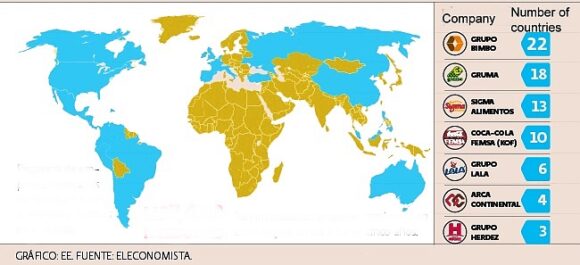Mexico’s seven leading food and beverage multinationals have invested a total of 7.42 billion dollars overseas in the past five years. The investments include acquisitions of other firms, building new plants and enlarging or remodeling existing plants.
The seven firms are:
- Coca-Cola Femsa
- Grupo Bimbo
- Arca Continental
- Gruma
- Sigma Alimentos
- Grupo Lala
- Grupo Herdez
In terms of the number of countries where they have a presence, the two most globalized food and beverage firms in Mexico are Grupo Bimbo and Gruma, which are in 22 and 18 countries respectively (see map). Both firms are now quite dependent on foreign earnings. About 61% of Bimbo’s revenues, and almost 70% of Gruma’s revenues, originate from outside Mexico. Both firms have the longest reach of any of the food and beverage multinationals: Bimbo as far as China, and Gruma in Australia.
In this post, we take a quick look at each of these seven firms and their recent activity abroad:
Femsa, based in Monterrey, is the world’s largest bottler of Coca-Cola products, with 45 plants in Latin America, including Colombia, Brazil and Venezuela, as well as 19 plants in the Philippines. It spent 1.855 billion dollars to buy Brazilian firm Spaipa, and a further 258 million dollars on building a new plant there (its tenth plant in Brazil), as well as 688.5 million dollars for 51% of the Coca-Cola Company in the Philippines. Femas also operates the OXXO chain of convenience stores, the largest such chain in Latin America.
Grupo Bimbo is the world’s largest bread maker and the biggest bread seller in the USA. It is the world’s 4th largest food company behind only Nestle, Kraft, and Unilever. Bimbo has 85 plants in the USA and Canada, 39 in Mexico, 32 elsewhere in Latin America, 10 in Europa and one in Asia. It has expanded primarily via acquisitions. It bought Canada Bread in 2014 for 1.66 billion dollars. In 2011, U.S. agencies authorized its purchase of Sara Lee for 709 million dollars. It also bought Bimbo Iberia (Spain) for 160 million dollars in 2011. It is now awaiting approval from Spanish regulatory authorities to complete its purchase of Panrico for 210 million dollars.
Gruma (main brands Maseca and Mission) is the world’s largest producer of corn flour and tortillas. It has 79 production plants worldwide and operates in North America, Europe, Asia and Oceanía. Gruma recently bought Azteca Foods Europe (Spain) for 48 million dollars. In 2014, it bought Mexifoods (Spain) for 15 million dollars. It also owns Albuquerque Tortilla Company. Gruma has also invested in new factories, including a 50-million-dollar plant in California, opened in 2010, as well as a new factory in Russia costing a similar amount.
Arca Continental, the second largest Coca-Cola bottler in Latin America, has 35 plants in the region. It purchased a milk products firm, Holding Tonicorp (Ecuador), in 2014 for 400 million dollars, and spent around 330 million dollars in 2012 to acquire two snack food firms: Wise Foods (USA) and Inalecsa (Ecuador).
Sigma Alimentos (cold cuts, cheese, yoghurts and other milk products) has 67 production facilities in total, including (in addition to Mexico) the U.S., Costa Rica, El Salvador, Spain, France, Italy, Netherlands, Belgium and Portugal. It recently bought Spanish firm Campofrío for 345 million dollars.
Grupo Lala (milk products) has 18 production plants in Mexico and Central America. It recently bought Nicaraguan firm Eskimo (ice-cream and other milk products) for around 53.2 million dollars.
Grupo Herdez has 13 plants in Mexico, one in the USA and one in Chile. It recently bought Helados Nestlé in Mexico.
What these firms have in common is that they specialize in making products that are relatively easy to adapt to local tastes (glocalization). They have also started their expansions outside Mexico by focusing initially on markets with familiar languages and culture before venturing further afield.
As interesting as where the companies ARE is where the companies are NOT. Astonishingly, the map suggests that no Mexican food-related multinational yet has a toe-hold in any country in Africa, for example.
Related posts:

Sorry, the comment form is closed at this time.